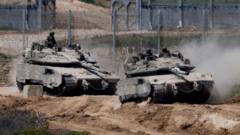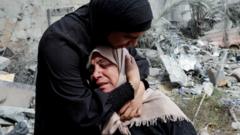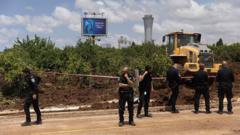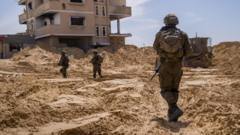The Israeli military's strategy to intensify its operations in Gaza, aiming to 'capture' the territory from Hamas, reflects escalating conflict dynamics and mounting humanitarian concerns.
**Israel Approves Expand Military Operations in Gaza Amid Rising Tensions**

**Israel Approves Expand Military Operations in Gaza Amid Rising Tensions**
Israel's security cabinet outlines a forceful plan against Hamas involving territorial 'capture' and potential humanitarian aid changes.
Israel's security cabinet has made a controversial decision to escalate military operations against Hamas with a plan that includes the potential 'capture' of Gaza. This comes as Prime Minister Benjamin Netanyahu announced a forceful operation intended to dismantle the Hamas threat while simultaneously addressing the humanitarian needs of those in the region.
An official from the cabinet confirmed the unanimous approval of this military strategy, which aims to exert increased pressure on the militant group amidst ongoing hostilities that resumed following the end of a two-month ceasefire. The plan emphasizes not only the defeat of Hamas but also the safeguarding of Israel through territorial control.
Netanyahu stated that the population of Gaza, currently numbering approximately 2.1 million, would need to be moved south for their protection, although he did not specify how much territory would be occupied. Critics, however, argue that this approach risks exacerbating the humanitarian crisis that has already left many Gazans in dire straits.
In light of the worsening food shortages under the two-month blockade, the security cabinet has proposed to enable aid deliveries through private companies. However, this proposal has drawn criticism from the United Nations, which asserts the changes would undermine basic humanitarian principles and disrupt existing aid infrastructure.
International responses have varied, with President Trump reiterating a commitment to facilitate food assistance to Palestinian communities while the UK government expressed disapproval of military expansions. The European Union echoed concerns regarding escalating civilian suffering.
The Israeli military's approach includes stringent measures to prevent Hamas from distributing aid and enhancing military pressure on the group. According to Israeli officials, the initial stages of this campaign will focus on seizing additional territories in Gaza and expanding a designated buffer zone along the border, which is intended to provide leverage in future negotiations with Hamas over a potential ceasefire and hostage situation.
As military actions intensify, humanitarian organizations warn that civilians, many of whom are already displaced, could face further hardships. Recent reports illustrate the humanitarian crisis facing Gazans, with community kitchens running low on essential supplies and health services straining under the weight of the ongoing conflict.
Amidst these developments, voices from Gaza express a firm resolve against forced evacuation. Residents, recalling their experiences in safe zones, declare their intention to remain despite escalating threats from Israeli forces.
The situation remains dynamic as Israel prepares to navigate both military objectives and the escalating humanitarian challenges, while global reactions continue to shape the geopolitical landscape around the Israel-Gaza conflict.



















